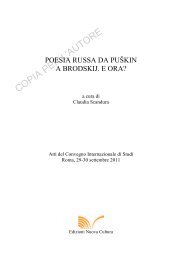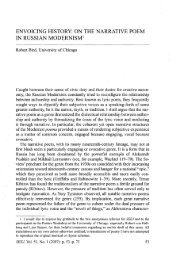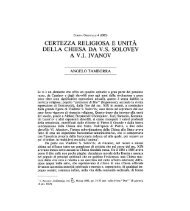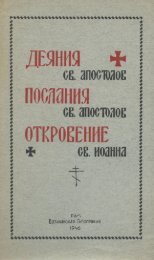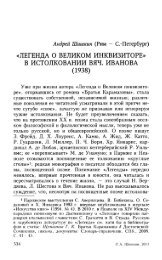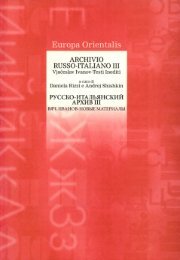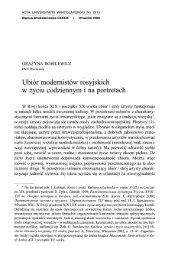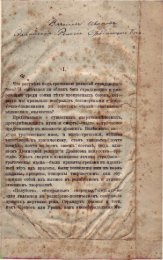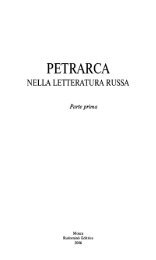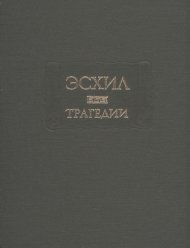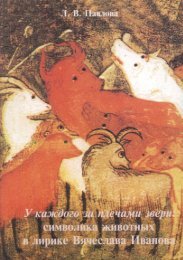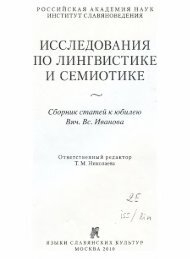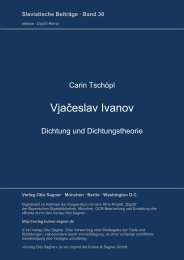Carol Ueland. Viacheslav Ivanov's Pushkin: Thematic and Prosodic ...
Carol Ueland. Viacheslav Ivanov's Pushkin: Thematic and Prosodic ...
Carol Ueland. Viacheslav Ivanov's Pushkin: Thematic and Prosodic ...
- No tags were found...
You also want an ePaper? Increase the reach of your titles
YUMPU automatically turns print PDFs into web optimized ePapers that Google loves.
CALIFORNIA SLAVIC STUDIES XV<br />
Cultural Mythologies of<br />
Russian Modernism<br />
From the Golden Age to the Silver Age<br />
Edited by<br />
Boris Gasparov, Robert P. Hughes,<br />
<strong>and</strong> Irina Paperno<br />
UNIVERSITY OF CALIFORNIA PRESS<br />
Berkeley Los Angeles Oxford
University of California Press<br />
Berkeley <strong>and</strong> Los Angeles, California<br />
University of California Press, Ltd.<br />
Oxford, Engl<strong>and</strong><br />
© 1992 by<br />
The Regents of the University of California<br />
Library of Congress Cataloging in Publication Data<br />
Cultural mythologies of Russian modernism: from the golden age to the silver age / edited by<br />
Boris Gasparov, Robert P. Hughes, <strong>and</strong> Irina Paperno.<br />
p. cm. — (California Slavic studies; 15)<br />
Papers delivered at a conference held at the University ol California, Berkeley, in May 1987,<br />
sponsored by the Center for Slavic <strong>and</strong> Hast European Studies.<br />
Includes bibliographical references.<br />
ISBN 0-520-06998-6 (alk. paper)<br />
1. <strong>Pushkin</strong>, Aleks<strong>and</strong>r Sergeevich, 1799-1837—Influence—Congresses. 2. Russian literature—<br />
19th century—History <strong>and</strong> criticism—Congresses. V Russian literature—20th century—<br />
History <strong>and</strong> criticism—Congresses. 4. Soviet Union—Intellectual life—19th century—Congresses.<br />
5. Soviet Union—Intellectual life—20th century—Congresses. I. Gasparov, В. II.<br />
Hughes, Robert P. III. Paperno, Irina. IV. University of California, Berkeley. Center for<br />
Slavic <strong>and</strong> East European Studies. V. Series: California Slavic studies: vol. 15.<br />
DK4.C33 vol. 15<br />
[PG3355.5]<br />
947 s—dc20<br />
[891.71*3] 90-10906<br />
Printed in the United States of America<br />
12 3 4 5 6 7 8 9<br />
The paper used in this publication meets the minimum requirements of American National<br />
St<strong>and</strong>ard for Information Sciences—Permanence of Paper for Printed Library Materials,<br />
ANSI Z39.48-1984.©,
CONTENTS<br />
Preface<br />
vii<br />
Introduction<br />
The "Golden Age" <strong>and</strong> its Role in the Cultural Mythology of<br />
Russian Modernism<br />
Boris Gasparov 1<br />
/. The Cultural Myth of <strong>Pushkin</strong><br />
Пушкин в жизни человека Серебряного века<br />
Irina Paperno 19<br />
Dialectics of Cultural Return: Zinaida Gippius' Personal Myth<br />
Olga Matich 52<br />
"Moi <strong>Pushkin</strong>": Briusov's Search for the Real Aleks<strong>and</strong>r Sergeevich<br />
Joan Delaney Grossman 73<br />
Tsvetaeva <strong>and</strong> the Two Natal'ia Goncharovas: Dual Life<br />
Liza Knapp 88<br />
Remarks on the Horse as a Space-Time Image from the Golden to<br />
Silver Ages of Russian Literature<br />
David M. Bethea 109<br />
Voyages of Escape, Voyages of Discovery: Transformations of<br />
the Travelogue<br />
Andrew Wachtel 128<br />
Тридцатые годы — железный век (к анализу мотивов столетнего<br />
возвращения у Мандельштама)<br />
Boris Gasparov 150<br />
//. <strong>Pushkin</strong> as an Institution<br />
<strong>Pushkin</strong> in 1899<br />
Marcus C. Levitt 183<br />
<strong>Pushkin</strong> in Petrograd, February 1921<br />
Robert P. Hughes 204<br />
Appropriating the Irreverent <strong>Pushkin</strong><br />
Greta N. Slobin 214<br />
Remembrance in Mikhailovskoe<br />
Stephanie S<strong>and</strong>ler 231
. <strong>Pushkin</strong> in the Twentieth Century:<br />
Readings, Texts <strong>and</strong> Subtexts<br />
Vladimir Solov'ev's <strong>Pushkin</strong> Triptych: Toward a Modern Reading of<br />
the Lyrics<br />
William Mills Todd III<br />
Tynianov, <strong>Pushkin</strong> <strong>and</strong> the Fragment: Through the Lens of Montage<br />
Monika Frenkel Greenleaf<br />
«Легкое дыхание» и «Станционный смотритель»: проблемы<br />
композиции<br />
Alex<strong>and</strong>er Zholkovsky<br />
Two Dialogues with Chaos: Tiutchev <strong>and</strong> Gippius<br />
Sarah Pratt<br />
Nikolai Gumilev <strong>and</strong> Théophile Gautier<br />
Simon Karlinsky<br />
<strong>Viacheslav</strong> Ivanovo <strong>Pushkin</strong>: <strong>Thematic</strong> <strong>and</strong> Prosodie Echoes of<br />
Evgenii Onegin in Mladenchestvo<br />
<strong>Carol</strong> <strong>Uel<strong>and</strong></strong><br />
<strong>Pushkin</strong> in Khlebnikov: Some <strong>Thematic</strong> Links<br />
Henryk Baran<br />
О некоторых подтекстах «Пиров» Пастернака<br />
Tomas Venclova<br />
Шестая повесть Белкина: Михаил Зощенко в роли Протея<br />
Irina Reyfman<br />
Weighing Nabokov's Gift on <strong>Pushkin</strong>'s Scales<br />
Sergei Davydov<br />
Appendix<br />
Silver Threads Among the Gold: Andrei Belyi's <strong>Pushkin</strong><br />
John E. Malmstad<br />
Андрей Белый. Пушкин (План лекции)<br />
(Publication <strong>and</strong> Commentary by John E. Malmstad)<br />
Note on Contributors<br />
Index
PREFACE<br />
This volume contains papers delivered at a conference held at the University<br />
of California, Berkeley, in May 1987. The organizers wish to thank the Center<br />
for Slavic <strong>and</strong> Eastern European Studies for its support of this project. The<br />
editors also would like to express their appreciation to Hugh McLean for his<br />
counsel <strong>and</strong> encouragement, <strong>and</strong> to Sheila Wolohan, William Nickell, Cornelia<br />
Brown, <strong>and</strong> Glen <strong>and</strong> Irina Worthey for their help in editing <strong>and</strong> typesetting<br />
the manuscript.<br />
We owe a deep debt of gratitude to the late R<strong>and</strong>y Bowlus, who produced<br />
this <strong>and</strong> many other volumes of California Slavic Studies. This was his last<br />
work <strong>and</strong> thus commemorates his contributions to the series over many years.<br />
<strong>Pushkin</strong> is cited throughout according to: A.S. <strong>Pushkin</strong>, Polnoe sobranie<br />
sochinenii v desiati tomakh, Izdatel'stvo Akademii nauk SSSR, Moskva-<br />
Leningrad, 1949.<br />
B.G.<br />
RPH.<br />
LP.
<strong>Viacheslav</strong> <strong>Ivanov's</strong> <strong>Pushkin</strong>: <strong>Thematic</strong> <strong>and</strong> Prosodie<br />
Echoes of Evgenii Onegin in Mladenchestvo<br />
CAROL UELAND<br />
В младенчестве моем она меня любила<br />
И семиствольную цевницу мне вручила.<br />
A. S. <strong>Pushkin</strong>, "Muza," 1821<br />
Three Russian Symbolists consciously attempted to renovate the genre of<br />
the poema to write an autobiography in verse: Aleks<strong>and</strong>r Blok in Vozmezdie<br />
(1910-1921), Andrei Belyi in Pervoe svidanie (1921) <strong>and</strong> <strong>Viacheslav</strong> Ivanov<br />
in Mladenchestvo (1913-1918). 1 Unlike Blok or Belyi, Ivanov focuses his<br />
autobiography on his formative childhood experiences, from birth to the<br />
age of six, to describe the inception of his aesthetic sensibility <strong>and</strong> his calling<br />
to the vocation of poetry. All three poets found their generic models in<br />
<strong>Pushkin</strong> <strong>and</strong> employ numerous allusions to his works, especially Evgenii<br />
Onegin. <strong>Ivanov's</strong> poema, however, is unique in employing the verse form<br />
created by <strong>Pushkin</strong> for his novel, the so-called "Onegin stanza." 2<br />
While this<br />
stanzaic tour de force may have come easily to such a master of the sonnet<br />
form in Russian poetry as Ivanov, the ornate language of <strong>Ivanov's</strong> pre-1912<br />
works seems more stylistically incompatible with <strong>Pushkin</strong> than the style of<br />
either Blok or Belyi. Mladenchestvo interests us precisely because of the<br />
incongruity of <strong>Ivanov's</strong> style with <strong>Pushkin</strong>'s poetics.' This basic incompatibility<br />
between the two poets is revealed in <strong>Ivanov's</strong> highly idiosyncratic<br />
underst<strong>and</strong>ing of Onegin <strong>and</strong> its author. My discussion here will focus on<br />
the thematic <strong>and</strong> formal aspects of the reminiscences from Onegin in Mladenchestvo<br />
<strong>and</strong> the superimposition of <strong>Ivanov's</strong> philosophical views onto<br />
<strong>Pushkin</strong>'s characters from the novel. Before analyzing the poema in these<br />
terms, I shall examine the role of <strong>Pushkin</strong> in <strong>Ivanov's</strong> biography as well as<br />
in <strong>Ivanov's</strong> critical writings where he expounds his views of the poet.<br />
Mladenchestvo begins with a vision, seen by <strong>Ivanov's</strong> mother when pregnant,<br />
that the child she is carrying is to be a poet. The poem ends with the<br />
confirmation of this vision at a ritual family event at which his mother<br />
opens the Bible to foretell the future <strong>and</strong> r<strong>and</strong>omly selects a verse which<br />
identifies her child with King David, the archetypal Biblical model of the<br />
poet-prophet. According to <strong>Ivanov's</strong> "Avtobiograficheskoe pis'mo" (written
for the publisher S. A. Vengerov in 1917), in real life <strong>Ivanov's</strong> mother also<br />
provided a Russian role model for her young son, "Mother cultivated the<br />
poet in me, showing me portraits of <strong>Pushkin</strong>..." (SS 2:11). Along with<br />
such visual images of the poet, Ivanov grew up with <strong>Pushkin</strong>'s "Poet"<br />
("Рока ne trebuet poeta...") pasted to his bedroom wallpaper: "I took<br />
pleasure in constantly rereading <strong>and</strong> not underst<strong>and</strong>ing it" (SS 2:11). Unlike<br />
his younger Symbolist colleagues, Ivanov was old enough to witness personally<br />
the turning point in <strong>Pushkin</strong>'s literary reputation, the unveiling of<br />
the <strong>Pushkin</strong> monument in Moscow in 1881: ". . .1 stood, with a sinking<br />
heart, in front of the draped statue. . ." (SS 2:13). The experience itself<br />
evidently reinforced <strong>Ivanov's</strong> own belief in art as the unmediated disclosure<br />
of the Absolute: in the words of <strong>Ivanov's</strong> biographer, Olga Deschartes, "the<br />
falling of the coverings, the appearance of <strong>Pushkin</strong>'s image struck his heart<br />
like the revelation of a magic secret" (SS 1:8).<br />
Like other poets of the Silver Age, <strong>Ivanov's</strong> professional life periodically<br />
revolved around the commemoration of <strong>Pushkin</strong> at events <strong>and</strong> in publications.<br />
For the 1908 Vengerov edition of <strong>Pushkin</strong>'s works, he wrote a<br />
commentary to "Tsygany" (SS 4:299-323). Ivanov read this article at the<br />
celebration of the 125th anniversary of <strong>Pushkin</strong>'s birth at the Bolshoi<br />
Theater on June 6, 1924, which proved to be <strong>Ivanov's</strong> farewell appearance<br />
in his homel<strong>and</strong> before his emigration to Rome. 4<br />
One of his closest friends<br />
was the noted <strong>Pushkin</strong> scholar M. O. Gershenzon, to whom he dedicated<br />
his next article on <strong>Pushkin</strong>, "K probleme zvukoobraza u <strong>Pushkin</strong>a," (written<br />
in Rome in March-April 1925).- s<br />
Ivanov commemorated the ninetieth anniversary<br />
of <strong>Pushkin</strong>'s death with the lyric "Iazyk" (written on February 10,<br />
1927), which he revised <strong>and</strong> published ten years later in connection with the<br />
hundredth anniversary. 6<br />
This event was also the occasion for two more<br />
essays by Ivanov, "Roman v stikhakh" (which served as the introduction to<br />
an Italian translation of Evgenii Onegin published that year by Ettore Lo<br />
Gatto) <strong>and</strong> "Dva maiaka," originally given in Italian as a speech for the<br />
anniversary under the title "Gli aspetti del bello e del bene nella poesia del<br />
<strong>Pushkin</strong>" (SS 4:749-50). <strong>Ivanov's</strong> final outpouring of verse, his "Rimskii<br />
dnevnik 1944-go goda," included a lyric beginning with the famous opening<br />
line of Rus/an i Liudmila, "U lukomor'ia dub zelcnyi. . .," written on January<br />
27, the anniversary of <strong>Pushkin</strong>'s fatal duel. To the end of his career, Ivanov<br />
continued to identify with <strong>Pushkin</strong>'s images of the poet: he originally<br />
intended to title his last collection of verse "Arion," with the last four lines<br />
of <strong>Pushkin</strong>'s lyric to serve as an epigraph to the volume which thereafter<br />
became Svet vechernii (SS 1:207).
In addition to the essays specifically devoted to <strong>Pushkin</strong>, Ivanov often<br />
chose <strong>Pushkin</strong> to illustrate premises of his major theoretical articles. In an<br />
early essay, "Poet i спет'" (1904) Ivanov suggests that, for his generation,<br />
<strong>Pushkin</strong> serves only as the historical marker of a consciousness of the modern<br />
split between the poet <strong>and</strong> the crowd, which "genuine symbolism" will<br />
reconcile (SS 1:709, 714). However, by the time of <strong>Ivanov's</strong> essay "O granitsakh<br />
iskusstva," written in close proximity to his work on<br />
Mladenchestvo,<br />
Ivanov has restored <strong>Pushkin</strong> as a role model for contemporary poetry as<br />
well. In <strong>Pushkin</strong>'s lyrics describing the creative process Ivanov sees a precise<br />
description of his own notion of Apollonian inspiration, which is the<br />
moment when the diffuse sounds <strong>and</strong> images which the poet perceives find<br />
their ideal form (SS 2:630). In his analysis of <strong>Ivanov's</strong> essay "K probleme<br />
zvukoobraza u <strong>Pushkin</strong>a," Edward Stankiewicz (1986:102) has observed that<br />
in contrast to the Romantics <strong>and</strong> early Symbolists for whom poetic inspiration<br />
was a form of "rapture," for <strong>Pushkin</strong> inspiration "meant a higher, more<br />
advanced stage of poetic creativity which required the participation of reason<br />
in the 'structuring of the parts with relation to the whole,'" an underst<strong>and</strong>ing<br />
of inspiration which Ivanov clearly shared.<br />
For <strong>Ivanov's</strong> most extensive treatment of "his" <strong>Pushkin</strong>, we must look to<br />
the 1937 articles, clearly companion pieces, which were published together<br />
in Sovremennye<br />
zapiski (lxiv, 1937) under the title "O <strong>Pushkin</strong>e." Written<br />
late in <strong>Ivanov's</strong> career, these essays describe <strong>Pushkin</strong> in terms no longer<br />
familiar to most post-Formalist <strong>Pushkin</strong>ists, a <strong>Pushkin</strong> whose paramount<br />
feature for Ivanov is his religious sensibility. In "Dva maiaka" (SS<br />
4:330-342) Ivanov seeks to uncover the sources of <strong>Pushkin</strong>'s creativity,<br />
locating in his writings <strong>and</strong> biography two "beacons" of inspiration, the<br />
first of which Ivanov identifies as "the inscrutable appearance of Beauty,<br />
once at some time—<strong>and</strong> for his whole life—radiating in the poet's soul"<br />
<strong>and</strong> the second "his belief in holiness, in the reality of the holy life of select<br />
people, who escape from the world 'to the vicinity of God.' p<br />
In describing the first beacon—<strong>Pushkin</strong>'s apprehension of the beautiful—Ivanov<br />
maintains that it is neither an abstract philosophical conception<br />
nor a recollection of tangible experience. Following his mentor, Vladimir<br />
Solov'ev, 7<br />
Ivanov distinguishes between two planes of experience in <strong>Pushkin</strong>'s<br />
creative process, even in those cases where there seems to be an<br />
opaquely biographical source, such as the inspiration for the lyric "la pomniu<br />
chudnoe mgnoven'e":<br />
. . .even depicting 'the beauty' who had completely captivated him, the<br />
subject of his ardent desires, it was as if he involuntarily differentiated her
desired bodily substance from an essence radiating from her <strong>and</strong> not enshrouded.<br />
. .—an essence, 'higher than the world <strong>and</strong> passions,' that 'sacred<br />
thing of Beauty' before which even the lover, hurrying to an arranged<br />
rendezvous, suddenly stops <strong>and</strong> 'devoutly reverences.'<br />
Like Solov'ev (1898:16), who maintained that <strong>Pushkin</strong> "understood that<br />
beauty is only the tangible form of goodness <strong>and</strong> truth" [Solov'ev's italics],<br />
Ivanov also insists on a traditional unity of absolutes as the basis of <strong>Pushkin</strong>'s<br />
aesthetics:<br />
. . .the poet also proclaims the oneness of the nature [edinoprirodnost'] of<br />
Beauty <strong>and</strong> Good. . . .according to <strong>Pushkin</strong>, Beauty is revealed by the<br />
means of genius, <strong>and</strong> genius is a gift of Heavenly Grace, only working in<br />
harmony with Good.<br />
However, he stops short of fully identifying <strong>Pushkin</strong>'s views with the formative<br />
sources of his own aesthetics:<br />
<strong>Pushkin</strong> would not repeat, would, perhaps, not even underst<strong>and</strong> Dostoevski's<br />
ecstatic words, 'Beauty will save the world.' This sober <strong>and</strong> balanced<br />
umici, Hellenic in nature, this talent, inclined to cultivate the paradise<br />
ol the arts rather than extend its boundaries, did not know the dreams ol<br />
'theurgic' art which Vladimir Solov'ev invoked. . .<br />
Unlike many readers of <strong>Pushkin</strong> of his generation, including Solov'ev <strong>and</strong><br />
Merezhkovskii, Ivanov does not see <strong>Pushkin</strong>'s poetry as the forerunner of a<br />
new, prophetic art <strong>and</strong> rejects those readings of "Prorok" which see in the<br />
persona of the poem an ideal image of the poet. According to Ivanov this<br />
lyric depicts not the divine bestowal of artistic powers but the conversion<br />
experience of a visionary, a fundamental change in the character's psychological<br />
make-up, utterly alien to the intermittent nature of poetic inspiration<br />
as he understood it.<br />
But in the creative process, as a counterpoint to the ascent of inspiration,<br />
the poet also arrives at a state of creative exhaustion, a darkness of the<br />
soul, which must look outside of Beauty to revitalize itself. For Ivanov, this<br />
"cold dream" is the poet's "main enemy, the most evil of the demons: the<br />
poet called it 'boredom' [skuka], 'secret boredom,' 'melancholy' [toska],<br />
'despondency' [unynie], the latter being its canonical name in the list of<br />
mortal sins." Ivanov sees this alternate state as generating the darker<br />
moments in <strong>Pushkin</strong>'s opus. "No other poet—except perhaps Baudelaire or<br />
Verlaine—has expressed with as much force as <strong>Pushkin</strong> the torments of<br />
repentance <strong>and</strong> spiritual distress. He perspicaciously peers into the dark<br />
depths, where murderous passions feed their roots, blossoming in an infernal<br />
garden of mortal sins." Ivanov sees much of <strong>Pushkin</strong>'s work as an
investigation into the interrelatedness of sins, for example, the parallel<br />
nature of covetousness <strong>and</strong> passion in "Skupoi rytsar'" or of envy <strong>and</strong><br />
murder in "Motsart i Sal'eri." Ultimately, for Ivanov, these are but thematic<br />
variants on the central story of classical tragedy, that of man's revolt against<br />
God.<br />
What saved <strong>Pushkin</strong> the artist from the torments he depicts, according to<br />
Ivanov, was his vision of the second beacon, with the inception of a positive<br />
religious ideal in his work. Ivanov traces the origin of this process to <strong>Pushkin</strong>'s<br />
creation of the character of the monk Pimen in Boris Godunov, citing<br />
a suggestive note <strong>Pushkin</strong> wrote on the draft of the play which reads,<br />
"drawing near to that time when the earthly has ceased to absorb me." For<br />
Ivanov 1828 is the pivotal date after which <strong>Pushkin</strong>'s longing for a religious<br />
ideal becomes increasingly more visible in his work. As an example he cites<br />
<strong>Pushkin</strong>'s development of the contrast between Onegin's "despair" <strong>and</strong><br />
Tat'iana's longing for a simple life in his work on Evgenii Onegin in that<br />
year:<br />
At the time when Oncgm was being created, l'or the author the analysis of<br />
the hero imperceptibly turned into an examination of his own conscience;<br />
he already knew how to give it a name, depicting his murderous machinations,<br />
too close to the demon he knew of fastidious indolence <strong>and</strong> despondency,<br />
masked with arrogance. A longing for a distant, pure, holy life is<br />
heard in Iatiana's concluding woids.<br />
Ivanov finds a final confirmation of <strong>Pushkin</strong>'s religiosity in the lyric "Ottsy<br />
pustynniki i zheny neporochny," written six months before the poet's death,<br />
which paraphrases a Lenten prayer to drive away "the spirit of despondent<br />
idleness," leading Ivanov to conclude, "Little by little a religious inclination<br />
of the soul became customary <strong>and</strong> found for itself a solely sufficient expression<br />
in church forms." Ivanov asserts that far from having a minor role in<br />
<strong>Pushkin</strong>'s biography <strong>and</strong> works, the longing for a holy life as expressed in<br />
his later works inspired Dostoevskii—whom he calls the poet's constant<br />
pupil <strong>and</strong> imitator—in his own interpretation of Russian religiosity.<br />
<strong>Ivanov's</strong> other essay, "Roman v stikhakh" (SS 4:324-29) focuses on<br />
Evgenii Onegin alone. Like many Russian critics before him, Ivanov sets<br />
out to define the differences between <strong>Pushkin</strong> <strong>and</strong> Byron. He sees in Evgenii<br />
Onegin a new form of poetic narrative, fundamentally unlike Byron's Don<br />
Juan, which, while it suggested the possibility of the genre of a novel in<br />
verse to <strong>Pushkin</strong>, did not, in <strong>Ivanov's</strong> view, realize the potential of the<br />
form. In contrast, <strong>Pushkin</strong>'s novel in verse suggested new paths for the<br />
development of the genre of the poema in opening up new subject matter.
According to Ivanov, what distinguishes <strong>Pushkin</strong>'s work from his predecessor's<br />
is the fact that<br />
<strong>Pushkin</strong>. . .saw in the novel a broad <strong>and</strong> truthful depiction of life, as it<br />
presents itself to the observer in its double aspect: as a society, with its<br />
stable types <strong>and</strong> manners, <strong>and</strong> as a personality, with its ever new ideas <strong>and</strong><br />
claims.<br />
Through this new form, poetry could now accommodate a new level of<br />
reality, the everyday <strong>and</strong> the customary. Ivanov contrasts Byron's Don Juan,<br />
which he sees as a form of personal confession <strong>and</strong> therefore "subjective,"<br />
with the "objectivity" of <strong>Pushkin</strong>'s work, which successfully creates the illusion<br />
of a multi-layered reality within the world of the novel, an effect<br />
achieved by the juxtaposition of the characters' stories with that of the<br />
narrator:<br />
And since, especially in a novel the narrator, wanting to leave an impression<br />
of trustworthy evidence, must appear to the imagination of the readers<br />
no less lively than the characters themselves, precisely in order to achieve<br />
Ins objective goal, there was nothing else for <strong>Pushkin</strong> to do but to be the<br />
most subjective: to be himself, to seem to play himself in the scene, to<br />
appear as a carefree poet, lyrically open, willful in his pronouncements<br />
<strong>and</strong> moods, carried away by his own memories at times to the point of<br />
forgetting the main subject. But—miracle of mastery—in this extraneous<br />
story <strong>and</strong> apart from it in the attractive frame with that greater clarity <strong>and</strong><br />
brilliance of colors, with that greater freedom from the narrator <strong>and</strong> his<br />
autonomous completeness, in life wrapped up in itself, the characters <strong>and</strong><br />
events step forward.<br />
Thus in furthering the possibilities inherent in the form, <strong>Pushkin</strong>, in <strong>Ivanov's</strong><br />
view, created in Evgenii Onegin the progenitor of the main stream of<br />
Russian narrative literature, whether verse or prose.<br />
Like other critics, Ivanov locates in Evgenii Onegin <strong>Pushkin</strong>'s "overcoming<br />
of Romanticism," as epitomized in the resolution of the two major characters'<br />
fates: "Tat'iana is a living refutation of unhealthy Romantic fantasizing<br />
[khimerizm]. In Onegin an arrogantly self-affirming egoism <strong>and</strong> moral<br />
anarchy are unmasked. . . ." Extending his contrast of the two poets, Ivanov<br />
furthermore denies any ironic or satiric intent on <strong>Pushkin</strong>'s part:<br />
Byron's naturalism, mocking <strong>and</strong>, at times, cynical remains in the sphere<br />
of satire; its roots, then, find their nourishment in so-called 'romantic<br />
irony,' a morbidly experienced consciousness of the irreconcilable contradiction<br />
between dream <strong>and</strong> reality. <strong>Pushkin</strong>, on the contrary, was in the<br />
habit of unexpectedly becoming lost in admiration of the most prosaic<br />
reality, it would seem; satire did not at all enter into his plans, <strong>and</strong> his<br />
whole spiritual make-up was alien to romantic irony.
Although appearing to be simply an observer of the social order, in fact<br />
<strong>Pushkin</strong> purposely diminished Byron's Romantic hero to the dimensions of<br />
a salon portrait:<br />
And here, looking at us, in a true likeness is one of the ordinary Lucifers<br />
of everyday occurrence, awakened by the lion's roar of the great rebel—<br />
one of the countless souls, swirled around, like dry leaves, in the hurricane.<br />
The 'young acquaintance' whom the poet decided to 'sing of (in fact he<br />
simply analyzes him), is an exceptional person; by his energy <strong>and</strong> elegance<br />
of mind he could even belong to people of the highest type; but, weakened<br />
by idle pleasure, darkened by pride, deprived of the gift of spontaneous<br />
creative power, he is defenseless against the demon of pernicious boredom<br />
<strong>and</strong> inactive despondency.<br />
Thus, Onegin's tragic flaw fits into the larger survey of the theme of sin in<br />
<strong>Pushkin</strong>'s works in "Dva maiaka." Again insisting that "<strong>Pushkin</strong> meditated<br />
profoundly on the nature of human sinfulness," Ivanov takes a serious view<br />
of Onegin as a tragic hero:<br />
'Despondency' (acidia) is unmasked in Onegin; it is also 'depressing indolence,'<br />
'melancholic idleness,' 'boredom,' 'ennui' [kh<strong>and</strong>ra] <strong>and</strong>—at the base<br />
of it all—the spirit's despair in itself <strong>and</strong> in God. That this condition,<br />
tolerated <strong>and</strong> fostered by man in himself, is a mortal sin, as the Church<br />
recognizes it, is manifestly apparent in the novel: after all it leads Evgenii<br />
to the act of Cain.<br />
Ivanov finds support for his underst<strong>and</strong>ing of Onegin's "sin" in Dostoevski's<br />
famous "<strong>Pushkin</strong> Speech," citing the lines, "he killed Lenskii simply<br />
from ennui, who knows, perhaps from ennui about the world's ideal. . . ." 8<br />
In Dostoevskii's own fiction, Ivanov suggests, the reader will find a continuation<br />
<strong>and</strong> completion of the suggestive thematic potential of <strong>Pushkin</strong>'s<br />
novel. 9<br />
<strong>Ivanov's</strong> interpretation of <strong>Pushkin</strong>'s creative development <strong>and</strong> especially<br />
his reading of Evgenii Onegin may certainly strike contemporary biographers<br />
<strong>and</strong> critics of <strong>Pushkin</strong> as idiosyncratic, far from the mainstream of <strong>Pushkin</strong><br />
studies. The overly repetitive style of these late essays only reinforces the<br />
sense of how oddly humorless is <strong>Ivanov's</strong> response to <strong>Pushkin</strong>'s masterpiece,<br />
especially his denial of any satiric intent on <strong>Pushkin</strong>'s part <strong>and</strong> the casting<br />
of Onegin as a serious tragic hero. As literary criticism it perhaps deserves<br />
the dismissal accorded most Symbolist writings on <strong>Pushkin</strong> by later critics. 10<br />
Although Boris Tomashevskii was no less critical of Symbolist criticism of<br />
<strong>Pushkin</strong> than other scholars of his generation, he (1961:415) once suggested<br />
that the real value of this criticism lies in the light it sheds on each poet's<br />
creative use of <strong>Pushkin</strong> in his own literary work. <strong>Ivanov's</strong> essays frequently
serve as a commentary to his earlier poetry. Let us now turn to Mladenchestvo<br />
<strong>and</strong> see how these critical views of Onegin had been earlier incorporated<br />
into <strong>Ivanov's</strong> poem.<br />
According to his own notes to the poem, Ivanov began writing Mladenchestvo<br />
in Rome on April 10, 1913 <strong>and</strong> completed the first forty-five stanzas<br />
by May 23. He added the final three verses more than five years later, on<br />
August 15/28, 1918." At the time of writing Mladenchestvo, Ivanov was<br />
living in Rome with his step-daughter, Vera Shvarsalon, the daughter of his<br />
second wife, Lydiia Dmitrievna Zinov'eva-Annibal by her earlier marriage.<br />
Beginning in the autumn of 1912, they rented a small apartment on the<br />
Piazza del Popolo for about a year. The household included <strong>Ivanov's</strong><br />
daughter Lydia (whose memoirs [1982:147-154] furnish one of the few<br />
accounts of this period in <strong>Ivanov's</strong> life 12 ) <strong>and</strong> an infant son, Dmitrii, who<br />
had been born to Vera <strong>and</strong> Ivanov in July 1912. Surely the presence of such<br />
a young child in a small apartment helped to suggest the poem's subject<br />
matter. A visitor to the family in April, 1913, Lvgeniia Gertsyk, recalls in<br />
her memoirs (1973:70) the following discussion of <strong>Pushkin</strong> <strong>and</strong> Dostoevskij:<br />
In Ins attitude towards <strong>Pushkin</strong>, a chill was perceptible, in spite ol his<br />
usual admiration of <strong>Pushkin</strong>'s mastery. . .But Dostoevski! he loved with<br />
an ever living love, although in a different way, than that [which he lelt|<br />
for <strong>Pushkin</strong>, not as a reverential student. . .But which Dostoevskij Dostoevskij<br />
st<strong>and</strong>s at the crossroads of too many roads—among them is one<br />
little-travelled, barely noticed track: <strong>Pushkin</strong>—Dostoevskii—<strong>Viacheslav</strong><br />
Ivanov. This is the perception of holiness as beauty,—or beauty as holiness<br />
('beauty will save the world'). It is sweet [sladostnyi] rapture in the contemplation<br />
of the world, not another one but this one, here, which all three<br />
of them selflessly (so differently) loved. This world, this earth. [Her italics]<br />
Thus, key elements of <strong>Ivanov's</strong> essays of more than twenty years later had<br />
been already formulated at the time when Mladenchestvo was being composed.<br />
Although details of <strong>Ivanov's</strong> life in Rome are sketchy, they suggest that<br />
this period was one of heightened concern about spiritual questions. He<br />
often debated the schism between Orthodoxy <strong>and</strong> Catholicism with his close<br />
friend, the Orthodox theologian, Vladimir Ern, who, according to Deschartes<br />
(Klimov 1974:18-21), dissuaded Ivanov from converting to Catholicism at<br />
this time. <strong>Ivanov's</strong> stay in Europe in 1912-1913 heralded a significant shift<br />
in his intellectual circle. Returning to Russia in the autumn of 1913, he<br />
settled not in Petersburg but in Moscow; the "Tower" period during which<br />
his apartment was the cultural center of Petersburg was definitely ended<br />
<strong>and</strong> with it <strong>Ivanov's</strong> role as literary arbiter in Symbolist <strong>and</strong> Acmeist circles.
In Moscow, Ivanov resumed active participation in the Moscow Religious-<br />
Philosophical Society, <strong>and</strong> his closest acquaintances were now leading figures<br />
of the Russian religious renaissance, such as Ern, Pavel Florenskii <strong>and</strong><br />
Nikolai Berdiaev, rather than literary figures. Current religious issues <strong>and</strong><br />
the historical role of Orthodoxy in Russian culture emerge as the major<br />
themes of his essays, thereafter collected in Borozdy i mezhi (1916) <strong>and</strong><br />
Rodnoe i vselenskoe (1917).<br />
At the same time as these changes in his life <strong>and</strong> intellectual orientation<br />
were taking place, <strong>Ivanov's</strong> poetry, beginning with that of 1912-1913, fundamentally<br />
changed as well. Most noticeable was the deliberate simplification<br />
of the more ornamental stylistic features of his earlier collections,<br />
Kormchie zvezdy, Prozrachnost' <strong>and</strong> Cor ardens. Both Nezhnaia taina, written<br />
in the summer of 1912, <strong>and</strong> Mladenchestvo struck <strong>Ivanov's</strong> contemporaries<br />
as marking a transition to a simpler lexicon, more straightforward syntax<br />
<strong>and</strong> a more direct relationship to the reader. Gumilev, reviewing Nezhnaia<br />
taina (1913:74-76), wrote: "His verse has acquired the power of confidence<br />
<strong>and</strong> impetuosity, his images—precision <strong>and</strong> color, his compositions—clarity<br />
<strong>and</strong> beautiful simplicity." An anonymous review of Mladenchestvo, signed<br />
P—r (1920:57) <strong>and</strong> probably written by Briusov, noted that the poem is<br />
"written in language typical of <strong>Viacheslav</strong> Ivanov of the last years: the<br />
gr<strong>and</strong>iloquence [velichavost'] of his former style has changed into a strict<br />
simplicity, still far, however, from conversational speech in the elegance of<br />
its vocabulary <strong>and</strong> the complexity of its phrasing." Averintsev (1986:42-43)<br />
goes so far as to call this "decisive turn" in <strong>Ivanov's</strong> career a "new poetic." 13<br />
In addition to stylistic modifications, <strong>Ivanov's</strong> poetry, like the essays of<br />
these years, adopts new thematic orientations, often treating political <strong>and</strong><br />
historical motifs. 14 In Mladenchestvo <strong>Ivanov's</strong> lifelong interest in the question<br />
of the poet's relationship to his culture was now directed to his own<br />
family history. In his essay of 1912, "Mysli о simvolizme," Ivanov had written:<br />
"Obviously the Symbolist artisan is inconceivable; just as inconceivable<br />
is the Symbolist aesthete. Symbolism deals with man. Thus it resurrects the<br />
word 'poet' in the old meaning—of the poet as a person (poetae nascuntur).<br />
. ." (SS 2:609).<br />
In the introductory stanza of Mladenchestvo, the narrator lays out a poetic<br />
credo in which the poet is depicted as a scribe recording memories, answerable<br />
to God, the Poet of the Universe, <strong>and</strong> ever conscious of the inner<br />
necessity of subordinating poetry to the "holy language of silence," a straining<br />
to the sounds beyond the phenomena of this world to the music of the<br />
spheres:
Вот жизни длинная минея,<br />
Воспоминаний палимпсест,<br />
Ее единая идея —<br />
Аминь всех жизней в розах кроем.<br />
Стройна ли песнь и самобытна<br />
Или ничем не любопытна,<br />
В том спросит некогда ответ<br />
С перелагателя Поэт.<br />
Ра мер заветных строф приятен;<br />
[срою были верен слог.<br />
Не так поэму слышит Бог;<br />
Но ритм его нам непонятен.<br />
Солгать и в малом не хочу;<br />
Мудрей иное умолчу.<br />
<strong>Ivanov's</strong> poet-narrator strongly resembles Dante's image of the scribe in<br />
the "Proem" to his Vita Nuova (which Ivanov was translating at the time of<br />
writing Mladenchestvo^<br />
), copying from his book of Memory, who sees factual<br />
events as subservient to the essence of their meaning. Describing himself<br />
as a humble transpose!', the poet acknowledges the distance between his<br />
own work <strong>and</strong> the rhythmic structure of the universe. The metaphors of the<br />
mineia <strong>and</strong> the palimpsest suggest two of the governing principles of the<br />
workings of memory in the poem as a whole. Like a mineia the poem presents<br />
a chronologically ordered succession of "saints" who have guided the<br />
poet's life: as the people who formed the child's earliest experiences appear,<br />
the narrator repeatedly underlines their iconic quality, for example in recalling<br />
his father ("Ottsovskii lik dusha nakhodit" XXX) or his nurse ("I v<br />
pamiati rassvetno-rannei/ Mertsaet oblik voskovoi. . ." XIII). The palimpsest—a<br />
parchment on which previous texts have been imperfectly erased<br />
<strong>and</strong> whose meaning thus remains decipherable—evokes an image of trying<br />
to catch shreds of meaning under another graphic representation, a metaphor<br />
for the memory's struggle to discern the underlying formative experience<br />
<strong>and</strong> the artist's struggle to discern the underlying "logos," the original<br />
text.<br />
In contrast to the solemn, laconic tone of this introductory stanza, the<br />
first line of the narrative abruptly shifts to a livelier, more familiar style:<br />
Отец мой был из нелюдимых.<br />
Из одиноких, — и невер.<br />
Стеля по мху болот родимых<br />
Стальные цепи, землемер<br />
I
(Ту груду звучную, чьи звенья<br />
Досель из сумерек забвенья<br />
Мерцают мне, — чей странный вид<br />
Все память смутную дивит), —<br />
Схватил он семя злой чахотки,<br />
Что в гроб его потом свела.<br />
Мать разрешения ждала, —<br />
И вышла из туманной лодки<br />
На брег земного бытия<br />
Изгнанница — душа моя.<br />
The rhythm <strong>and</strong> syntax of the opening line of Evgenii Onegin combined<br />
with Tat'iana's memorable epithet for Onegin ("No govoriat, vy neliudim"<br />
[V, 70] 16 ) forge an immediate association for the reader between <strong>Ivanov's</strong><br />
father <strong>and</strong> <strong>Pushkin</strong>'s hero. Such direct allusions to <strong>Pushkin</strong>'s text are comparatively<br />
rare in Mladenchestvo.<br />
Unlike Blok in Vozmezdie or Belyi in Pervoe<br />
svidanie, Ivanov does not weave many pointed allusions to <strong>Pushkin</strong>'s<br />
works into his narrative, nor, despite the stylistic simplification noted above,<br />
does he generally alter his distinctive lexicon or syntax to make his line<br />
sound more like <strong>Pushkin</strong>'s. Rather he suggests to the reader through such<br />
pointed echoes that the members of his family should be associated with<br />
recognizable literary types. The opening association of <strong>Ivanov's</strong> father with<br />
Onegin is not reinforced until much later in the poem. The following lines<br />
of the stanza seem to convey in a straightforwardly novelistic manner the<br />
barest facts of his father's occupation <strong>and</strong> the cause of his death. However,<br />
the closing lines also introduce a central notion of <strong>Ivanov's</strong> poetry, the<br />
Platonic image of the soul as an exile in earthly existence. 17<br />
The structure of<br />
the stanza encapsulates the structure of the work as a whole by associating<br />
the father's death, dramatized much later in the poem, with the son's<br />
birth—two events which have no connection in time, but whose relationship<br />
forms the thematic center of the poem. Instead of the linear exposition of a<br />
typical family chronicle, in Mladenchestvo<br />
time operates in mythic patterns,<br />
revolving around repeated cycles of birth <strong>and</strong> death, one always immanent<br />
in the other.<br />
The poet's mother, introduced in the following stanza, incarnates the<br />
qualities of what Ivanov termed the feminine principle in culture. <strong>Ivanov's</strong><br />
views are most directly expressed in his article "O dostoinstve zhenshchiny"<br />
(SS 3:137-46):<br />
Owing precisely to the great wealth of her own psychical powers, woman<br />
seemed to antiquity <strong>and</strong> to this day seems to male impressionability to be
a mysterious creature <strong>and</strong> unanalyzable in her final depths. An agreement<br />
seems to exist among all men—consensus omnium virorum—in this perception<br />
ol woman as the unconscious keeper of some suprapcrsonal,<br />
natural mystery. We have grown accustomed to sense in this mystery the<br />
soul ol the Earth-Mother, dark <strong>and</strong> prophetic.<br />
The mother undergoes the first of the poem's many supernatural experiences:<br />
Мне сказывала мать, и лире<br />
Я суеверный гот рассказ<br />
Поведать должен: по Псалтири,<br />
В полночный, безотзывный час.<br />
Беременная, со слезами.<br />
Она, молясь пред образами,<br />
Bnpyi СЛЫШИТ. I .'1С ЖС'' 10ЧПО, к ней<br />
Младенец вскрикнул! ... и сильней<br />
Опять раздался lai душенный.<br />
Ilo мшимый крик I п мирГ> LI л лес.<br />
Живой шешанием чудес.<br />
Душой, от воли отрешенной,<br />
V дпнленл, \ ми iena.<br />
Прияла жаменье она.<br />
II<br />
The mother perceives the baby's cry in the womb, a miracle usually reserved<br />
for saints <strong>and</strong> heroes, as a divine message directing her to raise the child to<br />
be a poet. She is able to discern a higher reality despite the illusions of<br />
earthly life: "Mat' iasnovidela vpot'makh,/ Mirskoi ne obol'shchalas' lozh'-<br />
iu" (111). Non-rational means of cognition—prophecies, dreams <strong>and</strong> visions—<br />
recur repeatedly in her own life <strong>and</strong> eventually in that of her child. They<br />
are also characteristic of <strong>Pushkin</strong>'s heroine as described in Onegin (V, 101):<br />
Татьяна верила преданьям<br />
Простонародной старины,<br />
И снам, и карточным гаданьям,<br />
И предсказаниям луны.<br />
Ее тревожили приметы;<br />
Таинственно ей все предметы<br />
Провоз!лашали что-нибудь.<br />
Предчувствия теснили грудь.<br />
Жеманный кот, на печке сидя.<br />
Мурлыча, лапкой рыльце мыл:<br />
То несомненный знак ей был.<br />
Что едут гости. Вдруг увидя<br />
Младой двурогий лик луны<br />
И -Л \ipf\r Г IPROM гтппонм
The last line of the second stanza of Mladenchestvo<br />
cited above echoes<br />
<strong>Pushkin</strong>'s closure in the following stanza of Onegin in its rhythm <strong>and</strong> syntax:<br />
"Zhdala neschast'ia uzh ona."<br />
More than half of Mladenchestvo<br />
is devoted to the poet's parents, their<br />
backgrounds, courtship <strong>and</strong> the tension in the child's household arising<br />
from the opposition between his mother's religious vision <strong>and</strong> his father's<br />
equally archetypal male revolt against God. The family history presents<br />
thematic parallels with <strong>Ivanov's</strong> reading of Onegin<br />
as recounted above,<br />
notably Tat'iana's vision of a godly life <strong>and</strong> Evgenii's "sin of despair." While<br />
the mother's character remains fixed throughout the poem, the drama of<br />
the narrative derives from the father's progression from unbelief to a<br />
deathbed conversion. The further portrayal of the father includes epithets<br />
often used to characterized Onegin, although without the directness of the<br />
opening allusion (XV):<br />
Он холодно-своеобычен<br />
И не похож ни на кого;<br />
Каким-то внутренним отличен<br />
Сознаньем права своего —<br />
or the phrase "mrachnei osennikh tuch" in (XX) or more pointedly<br />
"ugrium (XXV), the word Nabokov (1975:11, 137) most associates with<br />
Onegin's "generic gloom." The place of the father's attempted rebellion<br />
against God, "v uedinennyi kabinet" (XXIV), is a direct quotation from<br />
<strong>Pushkin</strong>'s text (V, 19). As the father's health declines, the true cause of his<br />
malady is revealed: "muchila ottsa toska" (XXXIV).<br />
Hereafter the resemblance to Onegin ends. A long dormant religiosity,<br />
implanted in childhood ("On vsenoshchnoi, ot rannikh let, Liubil 'vechernii<br />
tikhii svet'" XXVII) is reawakened in the dying man by a vision of St.<br />
Nicholas:<br />
XLII<br />
Затих; прояснился; лепечет:<br />
«Утешься: верую теперь.<br />
Причастье душу мне излечит.<br />
Меж тем как ты читала, в дверь —<br />
Я вижу, входит этот самый,<br />
Что строго так глядит из рамы. . .<br />
Ты вышивала. . . Тот же вид!<br />
Подносит Чашу и велит<br />
За ним причастное моленье<br />
ТЪердить. Я начал. Вдруг меня<br />
Покрыла сверху простыня.
И заметался я, в томленье<br />
По Чаше, — а его уж нет. . .<br />
Шли за священником, чуть свет!»<br />
The details of this vision operate on both a realistic <strong>and</strong> symbolic plane: the<br />
communion chalice is kept covered until the proper moment <strong>and</strong> the enveloping<br />
cloth may literally be the priest's sleeves which enfold the communicant.<br />
However, in <strong>Ivanov's</strong> symbolic system the image clearly renders the<br />
desire to remove the veils which hinder man's communion with the Absolute,<br />
to perceive a higher reality. In the first lines of the following stanza,<br />
Христос приходит. Ожиданья<br />
Ей не солгали. Долгий час<br />
За дверью слышались рыданья,<br />
Перерывавшие рассказ<br />
Души, отчаяньем язвимой,<br />
Любовью позднею палимой<br />
К Позвавшему издалека, —<br />
Christ's arrival expresses the communicant's belief in the presence of the<br />
divine in the ritual <strong>and</strong> the conferring of sanctification on the sinner. The<br />
appellative given to Christ, "Pozvavshii izdaleka," reiterates the opening<br />
motifs of the soul's origin in another plane of existence <strong>and</strong> the otherworldly<br />
call.<br />
Juxtaposed to the ongoing drama of his father's battle with God is the<br />
timeless world of the poet's childhood, which is repeatedly referred to as<br />
paradise or Eden. The title of the poema discloses its Orthodox orientation<br />
to time: the application of the word mladenchestvo to the first six years of<br />
life, while the st<strong>and</strong>ard nineteenth-century usage (Dal' 1881:2:332), also<br />
coincides with the first stage of human development in terms of responsibility<br />
to Orthodox Church ritual, the period before a child begins confession<br />
when he still retains his divinely originating innocence. Throughout the<br />
work the motif of the "holy language of silence" (silence designated as molchanie<br />
or bezmolvie) is linked to the vision of childhood as paradise by the<br />
sound associations of words with the etymologically unrelated roots<br />
mal I mladl molod. (Ivanov recoins the Latin infantia, inability to speak.) His<br />
mother's prophecy that he is to be a poet therefore marks the end of this<br />
period in the child's life.<br />
<strong>Ivanov's</strong> earliest childhood memory (XVII) is quite literally that of an<br />
Eden, as his first window on the world offered a view of the Moscow zoo,<br />
especially of the horns of the animals trying to break through their fences.
But as the narrator tries to probe even further back into his memory, he<br />
recalls as his most formative experience one which could not have happened<br />
in any actual sense:<br />
XX<br />
Мечты ли сонные смесились<br />
С воспоминаньем первых дней<br />
Отзвучья ль древние носились<br />
Над колыбелию моей<br />
Почто я помню гладь морскую<br />
В мерцаньи бледном — и тоскую<br />
По ночи той и парусам<br />
Всю жизнь мою — хоть (знаю сам)<br />
Та мгла в лицо мне не дышала,<br />
Окна не открывал никто,<br />
Шепча: «вот море» ... и ничто<br />
Сей грезы чуждой не внушало.<br />
Лишь поздно очи обрели<br />
Такую ночь и корабли.<br />
For <strong>Ivanov's</strong> narrator, as for Dante's, the factual details of an experience<br />
are less important than the essence of its meaning as he perceives it. The<br />
vision of the sea recorded here cannot be rooted in the objective phenomena<br />
of the child's world, but is no less real as a vestige of Platonic memory, a<br />
visual equivalent for detecting the sound waves of the "silence" of mystical<br />
experience:<br />
XXI<br />
Но, верно, был тот вечер тайный,<br />
Когда, дыханье затая,<br />
При тишине необычайной,<br />
Отец и мать, и с ними я,<br />
У окон, в замкнутом покое,<br />
В пространство темноголубое<br />
Уйдя душой, как в некий сон,<br />
Далече осязали — звон...<br />
Они прислушивались. Тщетно<br />
Ловил я звучную волну:<br />
Всколеблет что-то тишину —<br />
И вновь умолкнет безответно...<br />
Но с той поры я чтить привык<br />
Святой безмолвия язык.
Though denying its actuality, the narrator affirms the psychological authenticity<br />
of this moment of mystical communal experience with his parents.<br />
The overall structure of the poem also illuminates the relationship<br />
between the generations in the implicit idea that the child's life will reproduce<br />
the pattern of his father's, the soul's turn away from <strong>and</strong> return to<br />
God that is the plot design of all Christian biography. 18<br />
The father's struggles<br />
with God coincide with the child's period of natural innocence, when<br />
he retains intimations of immortality. As the father undergoes his visionary<br />
experiences, culminating in his return to Orthodoxy, the child progressively<br />
loses this original state of innocence <strong>and</strong> his world becomes increasingly<br />
clouded by the illusions of earthly reality, at one point again expressed by<br />
the motif of the falling curtains: "Zavesy padaiut glukhie/ Na pervozdannyi<br />
moi Edem" (XXVIII). In the penultimate stanza of the poem, the mother<br />
has a vision of her child's future path of struggle between good <strong>and</strong> evil as<br />
the child grows conscious of the duality of existence:<br />
Xl.VII<br />
Шесть весен... Видит у подножья<br />
Высокой лестницы во сне<br />
Man» духа гьмы и духа Ьожьи<br />
В бореньи трудном обо мне...<br />
В старинной церкви Спиридонья<br />
Родимой гонкого просош.и<br />
Являют новые струи<br />
Простор пустынной солеи<br />
И два по клиросам кумира:<br />
Тут — ангел медный, гость небес;<br />
Там - аггел мрака, медный бес...<br />
И два таинственные мира<br />
Я научаюсь различать,<br />
Приемлю от двоих печать.<br />
Thus, the poem culminates in the birth of the child's earthly double:<br />
XLVIII<br />
Лобзает вежды луч янтарный<br />
И пишет «радость» по стене, —<br />
И полнотою светозарной<br />
Вдруг сердце замерло во мне!<br />
Все спит. Безлюден двор песчаный.<br />
Бегу в цветник благоуханный.<br />
В цветах играют мотыльки,<br />
Как окрыленные цветки.
Впервые солнечная сила,<br />
Какой не знал мой ранний рай,<br />
Мне грудь наполнила по край<br />
И в ней недвижно опочила...<br />
Пробился ключ; в живой родник<br />
Глядится новый мой двойник...<br />
In this moment of overflowing vitality, the loss of the child's early paradise<br />
is compensated for by his sense of the fullness of being or, as Gertsyk<br />
earlier noted, the "sweet rapture in the contemplation of the world," which<br />
Ivanov felt was his common inheritance from <strong>Pushkin</strong> <strong>and</strong> Dostoevskii.<br />
Through the Onegin allusions, connecting his personal history to <strong>Pushkin</strong>'s<br />
novel—reinforced by the rhythm <strong>and</strong> rhyming patterns of the Onegin stanza—Ivanov<br />
adds a more familiar voice to that of his own narrator; this<br />
voice serves as a cultural mediator between his own experiences <strong>and</strong> those<br />
of his readers. The primary appeal of <strong>Ivanov's</strong> text as a form of autobiography<br />
would seem to lie largely in the authenticity of experience. However,<br />
by his addition of a layer of opaque literariness to the presentation of his<br />
family's story Ivanov effects that illusion of a multi-layered reality which he<br />
saw as <strong>Pushkin</strong>'s achievement in Evgenii<br />
Onegin.<br />
Notes<br />
1. V. I. Ivanov, 1918. Quotations from the poem in the text will indicate<br />
stanzas. The poem may also be found in <strong>Viacheslav</strong> Ivanov, 1971-1986<br />
(Sobranie sochinenii hereafter SS in text) 1:230-254 <strong>and</strong> <strong>Viacheslav</strong> Ivanov,<br />
1976:345-373.<br />
2. I have dealt with a statistical analysis of <strong>Ivanov's</strong> use of the Onegin<br />
stanza in my dissertation, "Autobiographical Poemy of the Russian Symbolists:<br />
Aleks<strong>and</strong>r Blok's Vozmezdie, <strong>Viacheslav</strong> <strong>Ivanov's</strong> Mladenchestvo <strong>and</strong><br />
Andrei Belyi's Pervoe svidanie" Diss. Columbia University,T990.<br />
3. As Sergei Averintsev (1976:35-36) has noted, "<strong>Pushkin</strong>ian clarity is<br />
alien to a Symbolist" <strong>and</strong> among the Symbolists, especially to Ivanov:<br />
"<strong>Viacheslav</strong> Ivanov seemed to want to overturn the historical victory of the<br />
'Arzamas' over the hyper-Slavonicism of the 'Society of Lovers of the Russian<br />
Word,' to return, over <strong>Pushkin</strong>'s head, to the pre-<strong>Pushkin</strong>ian sources<br />
of Russian poetry."<br />
4. For a further account of this occasion see SS 4:743-44.<br />
5. The article first appeared in Moskovskii pushkinist, 1930. For an analysis<br />
see Stankiewicz, 1986:96-107.
6. For an analysis of this poem in connection with <strong>Ivanov's</strong> theories of<br />
language see Venclova, 1986:108-122.<br />
7. For Solov'ev's views of <strong>Pushkin</strong> see William Todd's article in this<br />
volume.<br />
8. He does, though, differentiate his reading of Onegin's sin from Dostoevskij<br />
to a certain degree on this point: "While approximating this evaluation,<br />
Dostoevskii at the same time obscures the true nature of ennuidespondency<br />
[kh<strong>and</strong>ra-unynie] as the absolute emptiness <strong>and</strong> death of the<br />
spirit, confusing it with ennui-sadness [kh<strong>and</strong>ra-toska] about something,<br />
which not only is not a mortal sin, but evidence of the life of the spirit" (SS<br />
4:329).<br />
9. The one specific example Ivanov cites, though he admits its discovery<br />
is not original with him, is the parallel of Raskol'nikov's "exact <strong>and</strong> even<br />
literal program" in the following lines of the second chapter of Onegin: "vse<br />
predrassudki istrebia,/ my pochitaem vsekh nuliami,/ a edinitsami sebia;/<br />
my vse gliadim v Napoleony;/ dvunogikh tvarei million/ dlia nas orudie<br />
odno."<br />
10. For example, Viktor Shklovskii writes (1923:200-201): "New wine<br />
has been poured into the <strong>Pushkin</strong>ian bottles. The bottles are still serviceable<br />
since art itself does not age, but the wine has already turned sour. The new<br />
interpretation advanced by the Symbolists, derived from Dostoevskii. . .has<br />
already become a cliché."<br />
11. Since Ivanov did not consistently date his works, when he does it is<br />
usually not without significance. The date of the poem's completion<br />
occurred on the Orthodox holiday of Uspenie or the Dormition of the Virgin,<br />
which, as discussed below, is connected to <strong>Ivanov's</strong> mother's role in<br />
the poem as the bearer of spiritual values.<br />
12. See also Gertsyk 1973:37-72.<br />
13. For an opposing view see Tamarchenko, 1986:91.<br />
14. After Nezhnaia taina <strong>and</strong> Mladenchestvo <strong>Ivanov's</strong> output of lyrical<br />
poetry decreased markedly for the next few years. Of these poems basically<br />
only those of the cycles "Lebedinaia pamiat'" <strong>and</strong> "Moi dorn" were retained<br />
or reworked for his last collection Svet vechernii. With the recent republication<br />
of the other poems of this period in S\S 4 the extent to which the<br />
poetry of 1914-1918 constitutes responses to the events of the First World<br />
War <strong>and</strong> the Revolution is now evident.<br />
15. Ivanov had offered to do the translation in a letter to the publisher<br />
Sabashnikov <strong>and</strong> signed a contract with him in April, 1913 (see Davidson<br />
1982:104). Part of it appeared as the introduction to <strong>Ivanov's</strong> article "O<br />
granitsakh iskusstva," in Trudy i dni, 1 (J914).
16. The appropriateness of this word to describe Onegin's character was<br />
even the subject of correspondence between <strong>Pushkin</strong> <strong>and</strong> Viazemskii. See<br />
Nabokov 1975 2:390-391.<br />
17. "Na breg zemnogo bytiia" is in fact a self-citation from <strong>Ivanov's</strong><br />
translation of Novalis (SS 4:692).<br />
18. In his "Avtobiograficheskoe pis'mo" Ivanov relates his youthful flirtation<br />
with "extreme atheism" S\S 2:13-14.<br />
Bibliography<br />
Averintsev, S. S. 1976. "<strong>Viacheslav</strong> Ivanov." In Ivanov 1976:5-62.<br />
1986. "The Poetry of Ivanov." In Vyacheslav Ivanov: Poet, Critic <strong>and</strong><br />
Philosopher, pp. 25-48. New Haven.<br />
Dal', V. 1881. Tolkovyi slovar' zhivogo russkogo iazyka. 4 vols. St. Petersburg-Moscow.<br />
2:332.<br />
Davidson, P. 1982. "Vyacheslav <strong>Ivanov's</strong> Translations of Dante." Oxford<br />
Slavonic Papers (Oxford) 15:103-131.<br />
Gertsyk, E. 1973. Vospominaniia. Paris.<br />
Gumilev, N. 1913. Apollon (St. Petersburg) 3:74-76.<br />
Ivanov, V. I. 1918. Mladenchestvo. Petrograd.<br />
1971-1986. Sobranie sochinenii. 4 vols. Brussels.<br />
J 976. Stikhotvoreniia i poemy. Leningrad.<br />
Ivanova, L. V. 1982-1983. "Vospominaniia о <strong>Viacheslav</strong>e Ivanove." Novyi<br />
zhurnal (New York) 147:136-154; 148:136-160; 149:110-126; 150: 130-159.<br />
Klimoff, A. 1974. "Dionysis Tamed: The Late Poetry of Vjaceslav Ivanov.<br />
Ph.D diss. Yale University. New Haven.<br />
Nabokov, V. 1975. Eugene Onegin. A Novel in Verse by Aleks<strong>and</strong>r <strong>Pushkin</strong>. 4<br />
vols. Rev. ed. Princeton.<br />
P—r. 1920. Khudozhestvennoe slovo (Moscow) 1-2:57.<br />
Shklovskii, V. 1923. "<strong>Pushkin</strong> i Stern: Evgenii Onegin!' In Ocherki po poetike<br />
<strong>Pushkin</strong>a, pp. 200-218. Berlin.<br />
Solov'ev, V. 1898. Sud'ba <strong>Pushkin</strong>a. St. Petersburg.<br />
Stankiewicz, E. 1986. "Vyacheslav <strong>Ivanov's</strong> Views on the Sound Fabric of<br />
Poetry." In Vyacheslav Ivanov: Poet, Critic <strong>and</strong> Philosopher, pp. 96-107.<br />
New Haven.<br />
Tamarchenko, A. "The Poetics of Vyacheslav Ivanov." In Vyacheslav Ivanov:<br />
Poet, Critic <strong>and</strong> Philosopher, pp. 83-95. New Haven.<br />
Tomashevskii, B. 1961. "Poeticheskoe nasledie <strong>Pushkin</strong>a (Lirika i poemy)."<br />
<strong>Pushkin</strong> (Moscow-Leningrad) 11:345-444.<br />
Venclova, T. 1986. "'Jazyk': An Analysis of the Poem." In Vyacheslav<br />
Ivanov: Poet, Critic <strong>and</strong> Philosopher, pp. 108-122. New Haven.




